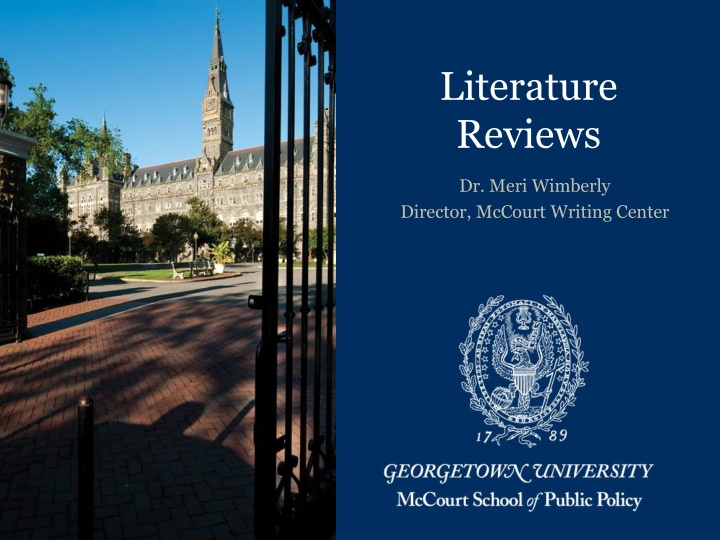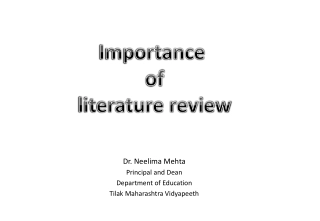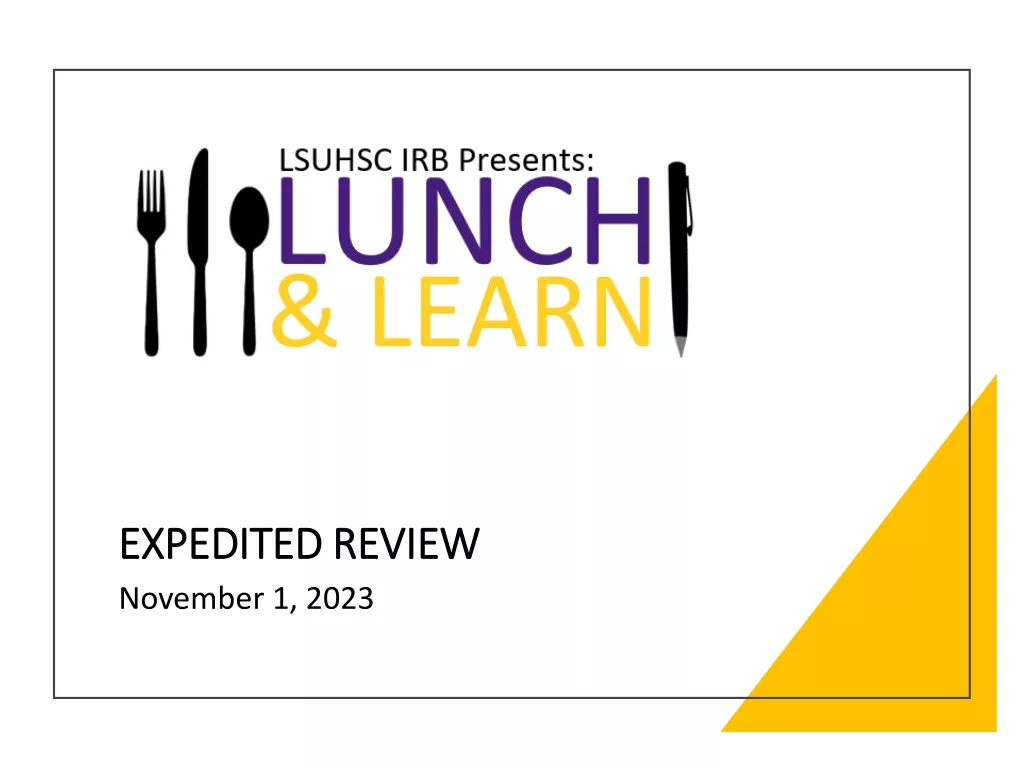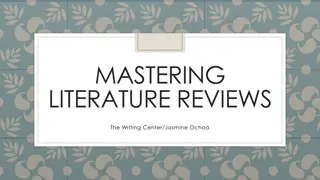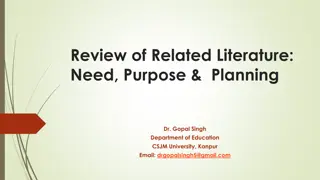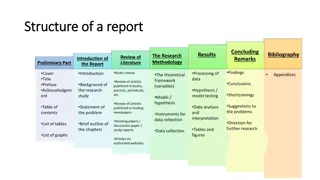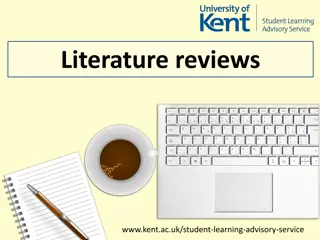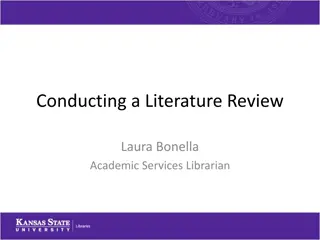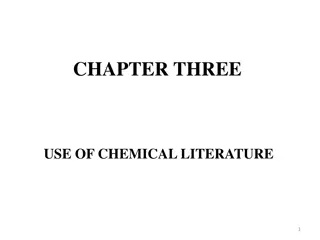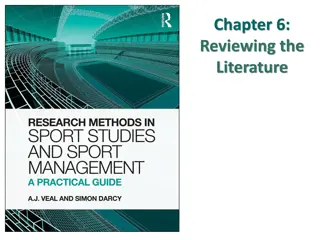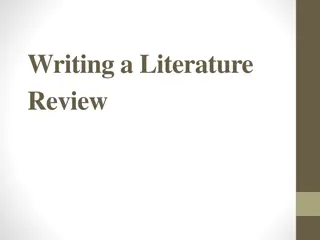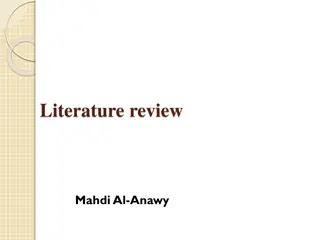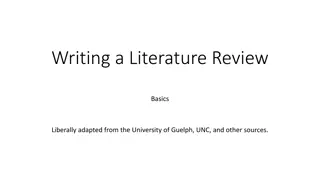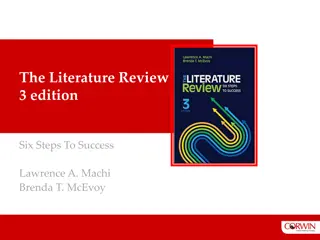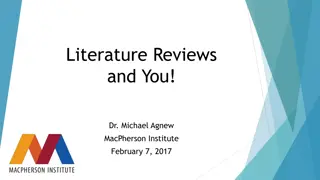Mastering the Literature Review Process for Effective Research
Understanding the essence of literature reviews, this guide by Dr. Meri Wimberly delves into the significance of synthesis, identification of gaps in research, and informing research design. It navigates the phases of writing process, emphasizing preparation, composition, and finalizing with valuable shortcuts to streamline literature search. Avoid cherry-picking sources to ensure a comprehensive review.
Download Presentation

Please find below an Image/Link to download the presentation.
The content on the website is provided AS IS for your information and personal use only. It may not be sold, licensed, or shared on other websites without obtaining consent from the author.If you encounter any issues during the download, it is possible that the publisher has removed the file from their server.
You are allowed to download the files provided on this website for personal or commercial use, subject to the condition that they are used lawfully. All files are the property of their respective owners.
The content on the website is provided AS IS for your information and personal use only. It may not be sold, licensed, or shared on other websites without obtaining consent from the author.
E N D
Presentation Transcript
Literature Reviews Dr. Meri Wimberly Director, McCourt Writing Center
What is a lit review? Synthesis: Combining multiple perspectives in order to create a new and better whole. A synthesis of the literature on a particular research topic that explains what is currently known (reliable conclusions) and what has yet to be discovered (gaps). Research topic: The policy problem or question you want to answer. Gaps: Unanswered questions, unexplored aspects, or unreliable conclusions. Reliable conclusions: Different studies have achieved the same results.
Inform the design of your research plan: What is the most important policy question and best way to find the answer? Why do a lit review? Use it to: Motivate your research. Help you interpret the results and provide policy recommendations.
The Writing Process PHASE I: PREPARATION Assessing the Context Genre identification Understanding parameters and expectations Topic Identification Research question The stakes Line of inquiry Research Finding and classifying sources Creating a bibliography Synthesizing multiple perspectives Planning Outlining
The Writing Process PHASE II: COMPOSITION Drafting Composing the introduction, body, and conclusion Feedback Peer Review
Revisions The Writing Process PHASE III: FINALIZING Clarifying and accepting feedback Revision planning Making substantive changes Editing Correcting the formatting Correcting mechanics and word choice Editing for concision and tone Proofreading Editing for typos Submission
Shortcuts Read reviews/summaries of the literature. See this and other organizations. Reach out to our policy librarian, Megan Hunt, at megan.hunt@georgetown.edu. Check out Megan s policy library guide here. Snowball. Use Google Scholar search with strict exclusion criteria (field and topic). Screen sources for relevance in terms of both topic and methodology. Read title read abstract skim article (Introduction and Results sections).
What is Synthesis? A THESIS is a claim. An ANTITHESIS is the opposite claim. SYNTHESIS is the combining of a thesis and its antithesis in order to create a new whole. It is the combining of multiple perspectives on an issue in order to develop a greater and stronger argument.
SYNTHESIS How-To Initial research: Know the debates around the topic. Find sources that represent multiple perspectives. Process your sources, noting the conclusions drawn and the methodologies and evidence that got them there. Place your sources into conversation: Determine how your sources agree, and how they disagree. Decide which conclusions are most reliable, and which are not. Use your research to make your own conclusion about what the literature tells us, and what it doesn t. What the literature tells us and doesn t is the thesis for your lit review.
SYNTHESIS Questions Are there obvious buckets of studies that relate to each other? How do these studies relate to each other, and how do they relate to the research question? Do they ask the same questions, use the same methods, and/or get the same results? How do they differ from each other? If similar studies reach different conclusions, why? What research designs or methods seem unsatisfactory? Consider sample size, confounding factors, etc. What evidence is lacking, inconclusive, contradictory, or too small-scale to be generalizable?
SYNTHESIS Example THESIS: Nuclear power plants are dangerous for the planet, because of accidents and fallout. We should use other sources of energy. ANTITHESIS: Nuclear energy is statistically one of the cleanest and cheapest sources. SYNTHESIS: The literature on nuclear energy reliably concludes that it is generally clean and safe. On the other hand, documented reports of accidents with tangible consequences on people s lives abound.
Leading into Your Project Therefore, what question remains?
Structure & Outlining Introduction Decide on the sections, and main arguments for each section. Explain the main point of each paragraph in a bullet point. Thesis Statement Body/Support Section Headings Sub-claims for each paragraph Conclusion
Lit review arguments are additive It s all about the LOGIC! Sub-Claim 1 + Sub-Claim 2 + Sub-Claim 3 + Sub-Claim 4 = the Thesis Statement
Introduction Purpose: What is the lit review about? The Stakes: Why do we need it? Thesis Statement Roadmap
Support Paragraphs Introductory Sentence: Sub-claim and link to thesis Analysis and Evidence Concluding Sentence: Restated Sub-claim and link to thesis Transition
Conclusion Restate thesis statement Policy takeaways Policy questions that emerge
Responsible Use of Source Material Quotations need to be incorporated grammatically into sentences. For example: According to Smith, true popular culture is culture of the people (2021, 16). See the library s APA tutorial here. Quotation marks must be used any time more than three words are taken directly from a text. Any time any information is taken from a source, an in- text citation corresponding to an entry on the References page is needed. To paraphrase, you must truly rewrite the entire sentence using your own words and structure.
Finalizing Revision Editing Proofreading SUBSTANTIVE CHANGES LOWER-ORDER CHANGES FINAL CHECK Thesis statement Format Typos Structure Style/tone Evidence Word choice Argumentation Concision Grammatical conventions
Whats next? The Writing Center is here if you want help! Visit our website for general services. Email dedicated thesis/capstone advisor Dr. Jeff Mayer at mayerjl@georgetown.edu for individual appointments. website mayerjl@georgetown.edu
